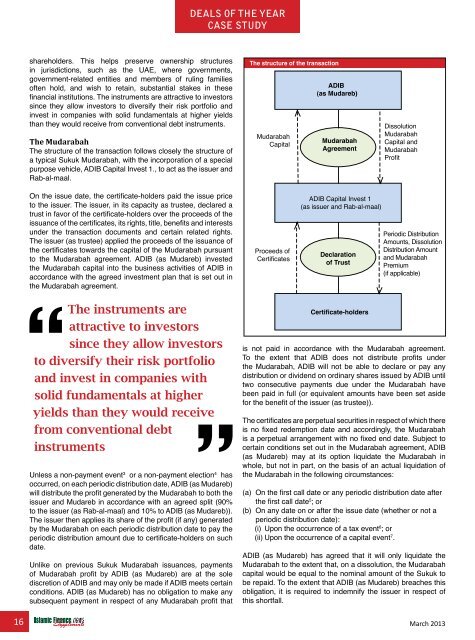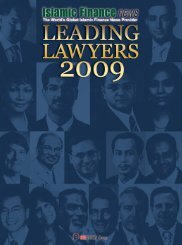View PDF Edition - Islamic Finance News
View PDF Edition - Islamic Finance News
View PDF Edition - Islamic Finance News
You also want an ePaper? Increase the reach of your titles
YUMPU automatically turns print PDFs into web optimized ePapers that Google loves.
deals of the year<br />
case study<br />
shareholders. This helps preserve ownership structures<br />
in jurisdictions, such as the UAE, where governments,<br />
government-related entities and members of ruling families<br />
often hold, and wish to retain, substantial stakes in these<br />
financial institutions. The instruments are attractive to investors<br />
since they allow investors to diversify their risk portfolio and<br />
invest in companies with solid fundamentals at higher yields<br />
than they would receive from conventional debt instruments.<br />
The Mudarabah<br />
The structure of the transaction follows closely the structure of<br />
a typical Sukuk Mudarabah, with the incorporation of a special<br />
purpose vehicle, ADIB Capital Invest 1., to act as the issuer and<br />
Rab-al-maal.<br />
The structure of the transaction<br />
Mudarabah<br />
Capital<br />
ADIB<br />
(as Mudareb)<br />
Mudarabah<br />
Agreement<br />
Dissolution<br />
Mudarabah<br />
Capital and<br />
Mudarabah<br />
Profit<br />
On the issue date, the certificate-holders paid the issue price<br />
to the issuer. The issuer, in its capacity as trustee, declared a<br />
trust in favor of the certificate-holders over the proceeds of the<br />
issuance of the certificates, its rights, title, benefits and interests<br />
under the transaction documents and certain related rights.<br />
The issuer (as trustee) applied the proceeds of the issuance of<br />
the certificates towards the capital of the Mudarabah pursuant<br />
to the Mudarabah agreement. ADIB (as Mudareb) invested<br />
the Mudarabah capital into the business activities of ADIB in<br />
accordance with the agreed investment plan that is set out in<br />
the Mudarabah agreement.<br />
Proceeds of<br />
Certificates<br />
ADIB Capital Invest 1<br />
(as issuer and Rab-al-maal)<br />
Declaration<br />
of Trust<br />
Periodic Distribution<br />
Amounts, Dissolution<br />
Distribution Amount<br />
and Mudarabah<br />
Premium<br />
(if applicable)<br />
The instruments are<br />
attractive to investors<br />
since they allow investors<br />
to diversify their risk portfolio<br />
and invest in companies with<br />
solid fundamentals at higher<br />
yields than they would receive<br />
from conventional debt<br />
instruments<br />
Unless a non-payment event 3 or a non-payment election 4 has<br />
occurred, on each periodic distribution date, ADIB (as Mudareb)<br />
will distribute the profit generated by the Mudarabah to both the<br />
issuer and Mudareb in accordance with an agreed split (90%<br />
to the issuer (as Rab-al-maal) and 10% to ADIB (as Mudareb)).<br />
The issuer then applies its share of the profit (if any) generated<br />
by the Mudarabah on each periodic distribution date to pay the<br />
periodic distribution amount due to certificate-holders on such<br />
date.<br />
Unlike on previous Sukuk Mudarabah issuances, payments<br />
of Mudarabah profit by ADIB (as Mudareb) are at the sole<br />
discretion of ADIB and may only be made if ADIB meets certain<br />
conditions. ADIB (as Mudareb) has no obligation to make any<br />
subsequent payment in respect of any Mudarabah profit that<br />
Certificate-holders<br />
is not paid in accordance with the Mudarabah agreement.<br />
To the extent that ADIB does not distribute profits under<br />
the Mudarabah, ADIB will not be able to declare or pay any<br />
distribution or dividend on ordinary shares issued by ADIB until<br />
two consecutive payments due under the Mudarabah have<br />
been paid in full (or equivalent amounts have been set aside<br />
for the benefit of the issuer (as trustee)).<br />
The certificates are perpetual securities in respect of which there<br />
is no fixed redemption date and accordingly, the Mudarabah<br />
is a perpetual arrangement with no fixed end date. Subject to<br />
certain conditions set out in the Mudarabah agreement, ADIB<br />
(as Mudareb) may at its option liquidate the Mudarabah in<br />
whole, but not in part, on the basis of an actual liquidation of<br />
the Mudarabah in the following circumstances:<br />
(a) On the first call date or any periodic distribution date after<br />
the first call date 5 ; or<br />
(b) On any date on or after the issue date (whether or not a<br />
periodic distribution date):<br />
(i) Upon the occurrence of a tax event 6 ; or<br />
(ii) Upon the occurrence of a capital event 7 .<br />
ADIB (as Mudareb) has agreed that it will only liquidate the<br />
Mudarabah to the extent that, on a dissolution, the Mudarabah<br />
capital would be equal to the nominal amount of the Sukuk to<br />
be repaid. To the extent that ADIB (as Mudareb) breaches this<br />
obligation, it is required to indemnify the issuer in respect of<br />
this shortfall.<br />
16 March 2013
















